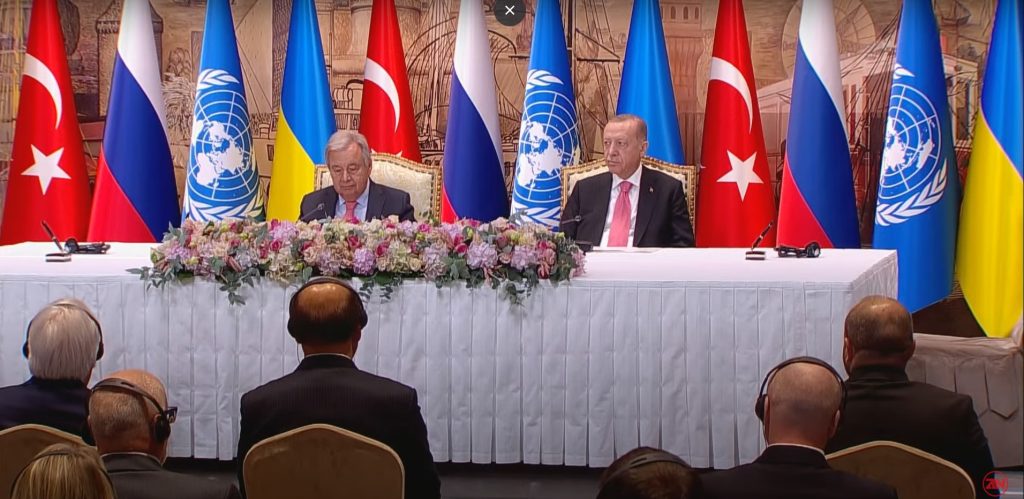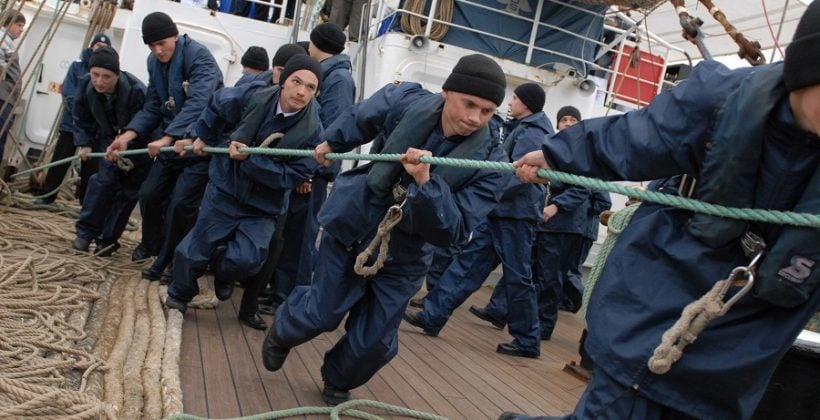Russia and Ukraine sign agreement for grain shipping corridor
Merchant ships to help free up grain exports from Black sea ports, but safety concerns remain

In what is hoped to be a major step in solving the growing global food crisis, Russian and Ukrainian officials have signed a deal with Turkey and the UN in Istanbul to allow ships to transport grain out of the region via a grain corridor.
The agreement will allow Ukraine to resume shipments of grain from three key Ukrainian ports in the Black Sea – Odesa, Chernomorsk and Yuzhny – to meet massive demand from the global market, while Russia would be able to export grain and fertilisers. It is expected that 22 million tons of grain and other agricultural products stuck in Ukraine’s Black Sea ports due to the war will now be able to be transported out of the region via merchant ships.
The conflict between Ukraine and Russia had halted exports, threatening world food security and caused prices of essential goods including cooking oils, fuels, fertiliser, wheat and barley to soar.
UN Secretary-General Antonio Guterres and Turkish President Recep Tayyip Erdogan oversaw the signing of The Safe Transportation of Grain and Foodstuffs from Ukrainian Ports Document. The agreement will establish a control centre in Istanbul, staffed by UN, Turkish, Russian and Ukrainian officials, that will run and coordinate the grain exports. The agreement includes provisions to check ships transporting the grain for weapons and for the safe passage of vessels along the grain corridor.
Speaking live at the signing, UN Secretary-General Antonio Guterres said: “Today there is a beacon of hope on the Black Sea, in a world that needs it more than ever. This is an agreement for the world and it will bring relief for developing countries on the edge of bankruptcy and the most vulnerable people on the edge of famine. Specifically, the initiative we just signed opens a path for significant volumes of commercial food exports from three key Ukrainian ports in the Black Sea – Odesa, Chernomorsk and Yuzhny. The shipment of grain and food stocks into world markets will help bridge the global food supply gap and reduce pressure on high prices. The agreement did not come easy. I urge all sides to spare no effort to implement their commitments.”
Turkish President Recep Tayyip Erdogan, said: “We are proud to be instrumental in an initiative that will play a major role in solving the global food crisis that has been on the agenda for a long time and agreed today. We did not get to this point all of a sudden, this has been an intensive an arduous process in collaboration with Russia, Ukraine and UN officials. The vessel traffic that will start in days will offer a new route to offer safe and reliable transfer of grain from ports. The support of international community is without doubt important in the success of this plan.”
Gueterres noted the pivotal role that IMO played in the agreement. IMO Secretary-General Kitack Lim said: “I am very pleased that all parties have reached agreement on the way forward for ships to safely transport much-needed grain and other commodities through the Black Sea. The safety of ships and seafarers remains my top priority. IMO instruments, including the International Ship and Port Facilities Security (ISPS) Code, underpin this agreement for safe and secure shipping through the Black Sea. I commend the efforts of all involved, particularly the IMO Member States – Russian Federation, Türkiye and Ukraine.”
Guy Platten, Secretary General of the International Chamber of Shipping (ICS) said it stands ready to work with all parties to ensure this initiative becomes a reality, adding: “This is a long-needed breakthrough for the millions of people who rely on the safe passage of grain to survive. But although this is an important step, lots of work remains to be done.
“Ensuring crew safety will be crucial if we are to get this agreement moving quickly. Questions remain over how ships will navigate heavily mined waters, and how we can effectively crew the ships in the region to meet the suggested deadline.”
John Stawpert, Senior Manager (Environment and Trade), ICS, added issues exist around crewing of ships that will be transporting grain from Ukraine. He noted that while at the height of the shipping crisis in the conflict there were an estimated 2000 seafarers stuck on board ships in the region, which, thanks to evacuations for crew safety, is now down to 450. Stawpert added: “We must look at how we can effectively crew those vessels and this must be considered as part of the agreement.”
He also noted that there is the need for up to 400 bulk carriers to be able to successfully carry grain out of the region, which falls far short of the estimated 109 vessels, of all ship types, currently stranded in ports in the region.
Related content

Seafarers International Relief Fund launches urgent Ukraine crisis appeal to support seafarers and their families

Russian and Ukrainian seafarers make up 14.5% of global shipping workforce, according to ICS

Supply chain issues will be compounded by lack of Ukrainian and Russian seafarers, says global body representing international shipping
